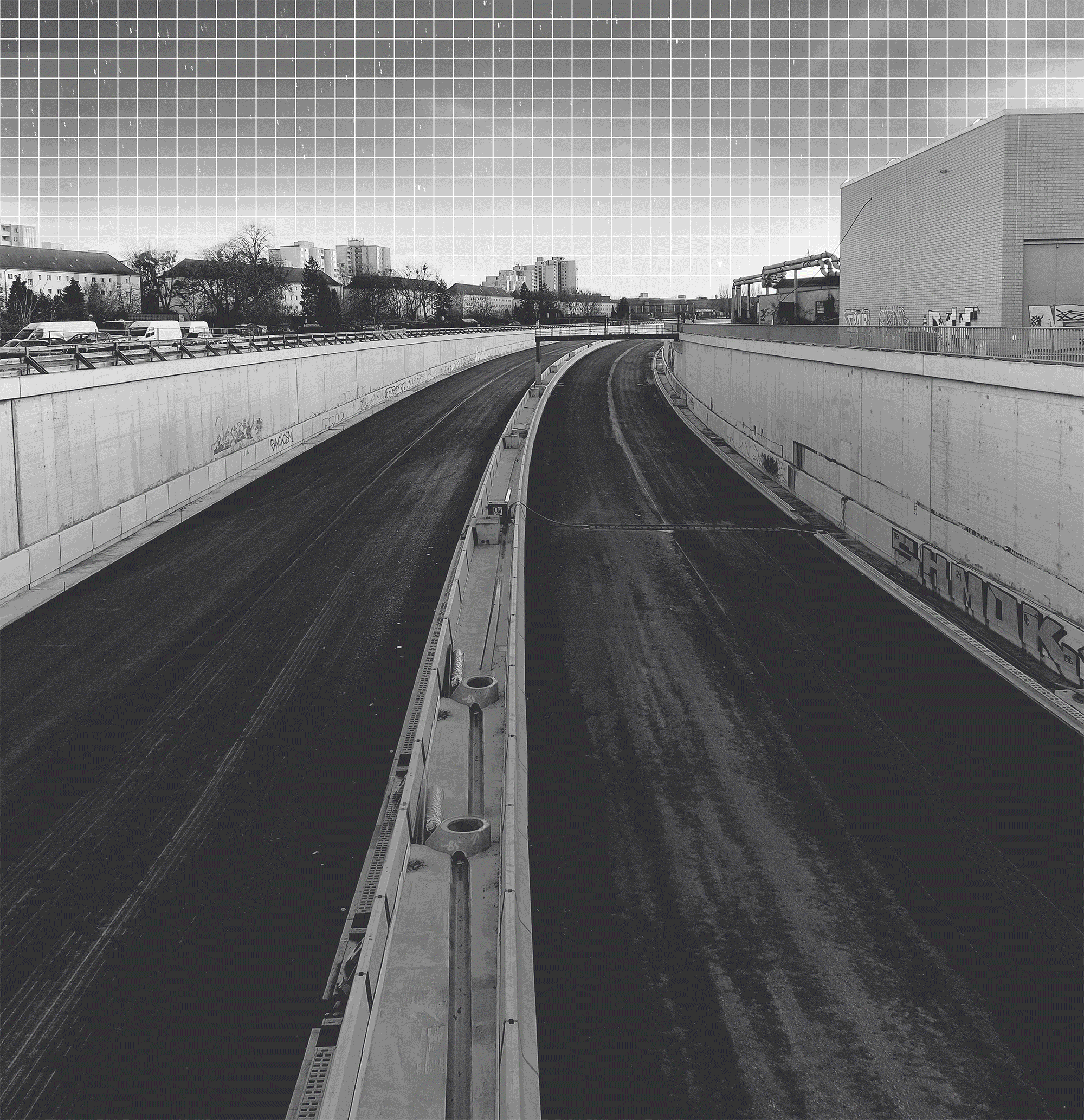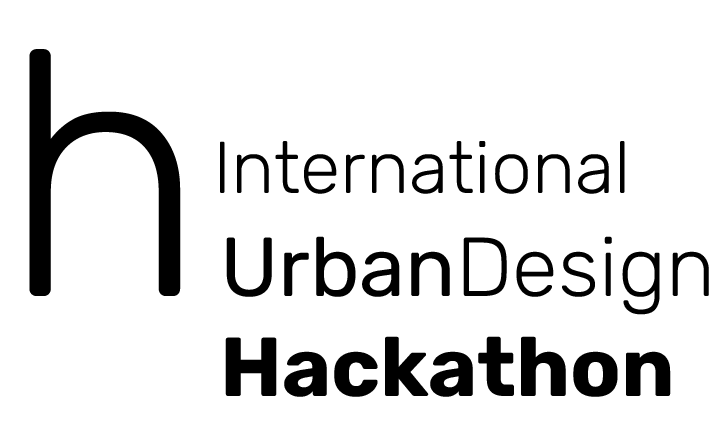
Close



An urban design workshop for international students from European schools of architecture.


An urban design workshop for international students from European schools of architecture.
by Claudia di Santo, Handan Sahin, Don Glückstein, Anastasiia Aniskina, Kristiana Traikova
Guidelines: organic materials; alternative movement; temporality recreation space
Tutors: Pola R. Koch, Martina Jacobi
“100 Stitches” aims to heal the scar created by the A100. The red, pixel-like structure acts as a patch that connects to its surroundings. Modular and adaptable, it takes on different functions along the highway: housing, sports, gardens, parks, market and entertainment, changing in size and purpose according to the current needs of its users.
by Christian Lang, Mariia Murai, Ana Paulina Graf, Elena Raycheva, Millicent Afoakwa Mo
Guidelines: fluid, flexible, fun
Tutors: Gabriele Gagliardi, Rossy Bratkova
Fluid, flexible and fun: the “Grow with the Flow” project uses water as the main element of reconnection. Flowing through the A100 to the Spree, the water takes on different roles as it moves through its surroundings. In the south, local aquaponic food production, combining fish aquaculture and hydroponic vegetable gardening. Natural filtration, allows residents to finally swim in Berlin canals. Floating pavilions and a green waterfront create a soft margin, new interaction spaces between the water and the city.
by Niklas Gartner, Sofia Holtz, Sandile Vincent Maphumulo, Maxim von Helden, Diana Manolova
Guidelines: environmental sensitive; bottom-up; with the flow
Tutors: Steffen de Rudder
The project “Canal of Happiness” uses the highway as a sponge to collect rainwater. Taking on different shapes and temperatures, water flows and invites residents to enjoy public life in a variety of functions. An extensive glass roof transforms the road into a greenhouse with private and public gardens for recreation. Floating housing units adapt to the water level, rising and lowering as needed. Darker tunnel areas accommodate more intimate uses: a sauna in the north and a nightclub in the south.
by Marc Jähning, Anne Archner, Borislava Manolova, Heorhii Maksymenko, Melissa Kimberly Talbert
Guidelines: less concrete more green; joyfull; influence people
Tutors: Anna Pomazanna
The reuse of the A100 as an inhabited space: the main idea of the “A100 to A 100 Houses” project. Social housing for a lifetime. Houses for recreation and temporary use. A green living room to spend quality free time. Houses for culture, sport and community in the tunnels. Functions and building structures that also act as vertical links between the walls and the surroundings. A highway filled with greenery and waterways to be used as a source by its inhabitants.

Bauhaus Universität Weimar | UACEG Sofia | TU Ilmenau
BTU Cottbus-Senftenberg | Kharkiv School of Architecture
The Urban Design Hackathon is back!
In its fourth edition we will stop a disaster in the making, the almost completed building of the A100 Berlin city highway.
Once a symbol of modernity, today it represents an outdated policy of favouring car-oriented urban development. Plans for further expansions would demand extensive engineering works, a significant budget and would seriously damage the urban fabric. The outdated planning provides a clear incentive for a surge in the number of cars and an increase in carbon emissions – precisely the opposite of what cities like Paris, Copenhagen or Barcelona are currently doing.
The 16th section of the A100 is finished, but not yet in operation. If the motorway is opened next year as planned, there is a threat of traffic collapse in the Berlin hinterland. But it is never too late to do the right thing: bury the old plan and think again! The colossal valley-like infrastructure is a unique chance to turn the tide and to develop a thousand new ideas – literally anything is better than a new motorway.
The question for this year’s Hackathon is: how do you turn the car traffic ruin, a symbol of past time planning, into a catalyst for sustainable urban development?
A100: Löst diese Autobahn Berlins Stauprobleme
https://www.youtube.com/watch?v=AN-JtkKJY4A&ab_channel=rbb24
Drone footage 10.09.2023
https://www.youtube.com/watch?v=ACf0t56ZKwI
Mehrere Tausend Menschen demonstrieren gegen den A100-Ausbau
https://www.youtube.com/watch?v=i-1SXoueOOE
Berlin, Neubau Bundesautobahn 100 16. BA
https://www.baustellen-doku.info/berlin_neubau_bundesautobahn-100_16.ba/
Université de Liège
Lecture by Karel Wuytack
Impression: S-Bahnhof Messe Nord / ICC
Impression: Underground Messedamm
Impression: West Facade
Impression: Car Passage West – East
Impression: Pedestrian Passage
Impression: Parking Building
Impression: Messedamm
Impression: Pedestrian Bridge Messedamm
Impression: Messedamm / Neue Kantstraße
The Urban Design Hackathon is organized by the “Chair of Urban Design” of the Bauhaus University Weimar. It started as part of the “International Virtual Academic Collaboration” (IVAC) program of the German Academic Exchange Service (DAAD). It is now funded by “Stiftung Innovation in der Hochschullehre“.
Chair of Urban Design
Steffen de Rudder | Martina Jacobi |
Gabriele Gagliardi
Bauhaus-Universität Weimar
Geschwister-Scholl-Straße 6
2. OG, Raum 202
99423 Weimar Germany
This website displays external content from Vimeo.com.
Deadline October 20.2023
Seminar Master and Bachelor final year Arch + Urb
6 ECTS
English
20 Final Years Bachelor and Master Students
4 – 6 from each University
Please send your portfolio to
urbandesignhackathon[at]uni-weimar.de
As part of the application process, we ask all participants to submit a 40-second self introduction video with the following information:
FRI 17.11.2023
14:00 – 14:15 Welcome / Opening
14:15 – 14:45 Presentation Participant Universities
14:45 – 15:30 Team Definition
15:30 – 15:45 Break
15:45 – 16:10 Team Presentations
16:10 – 16:30 Tutorial BBB / Tools
16:30 – 17:00 Q&A / Meet up
Day One – FRI 24.11.2023
13:00 – 13:10 Welcome / Opening
13:10 – 13:30 Introduction / Task
13:30 – 14:10 Input Lecture
14:10 – 14:20 Break
14:20 – 15:00 Input Lecture
15:00 – 15:30 Q&A
16:00 – 00:00 Section 1
Day Two – SAT 25.11.2023
08:00 – 12:00 Section 2
12:00 – 13:00 Feedback with Tutors
13:00 – 00:00 Final Section
00:00 DEADLINE
Day Three – SUN 26.11.2023
13:00 – 15:30 Final Presentation
15:30 – 15:45 Break
15:45 – 17:30 Discussion Round / Closing
The Urban Design Hackathon is organized by the “Chair of Urban Design” of the Bauhaus University Weimar. It is part of the “International Virtual Academic Collaboration” (IVAC) program of the German Academic Exchange Service (DAAD).
Bauhaus-Universität Weimar
Geschwister-Scholl-Straße 6
2. OG
99423 Weimar
Germany
phone: +49 (0) 36 43/58 2601
e-mail: staedtebau1[at]archit.uni-weimar.de
e-mail: urbandesignhackathon[at]uni-weimar.de
All data on this website is for information purposes only. It does not claim to be complete or correct. We reserve the right to make changes.
Image Credits
The images on this page are in most cases protected by copyright. The source/copyright of the images is the “Chair of Urban Planning and Design” of the Bauhaus University Weimar, unless otherwise stated below.
Videos: Martina Jacobi
Mice Video by thiago rizardi from Pexels
Site Images: Martina Jacobi, Pola Rebecca Koch, Stefan Siegner, Felix Torkar, Denis Barthel
Images Project Stairway to Chicken: Patrīcija Helēna Dzērve, Noé Misson, Leila Unland, Toms Čudars
Images Project From Mono to Multi: Richard Corsyn, Eliza Anna Zeibote, Maximilian Schmidt, Laura Bertelt
Images Project The Ant(i) Mall: Gaultier Arnould, Laura Svede, Jasmin Min Chu, Corentin Generet
Images Project ShareStadt: Pauline Oldrizzi,Olivier Roulet, Jekabs Ozols, Florian Brettner
Videos Input Lectures: Karel Wuytack, Elisa Baldin, Ludwig Voz, Adam Peterkenne
Dinosaur Icon made by Freepik from www.flaticon.com
Design: Leonardo Hermel
The Urban Design Hackathon is a 24h online workshop for international students from European architecture schools.
Over its past three editions, we tested and successfully established a new format of digital teaching and international collaboration – despite the pandemic and without environmentally harmful air miles. Supported by technically advanced tools, the virtual room became a common ground for learning and intercultural exchange for students and academics from ten institutions across Europe.
We invite students to develop future scenarios for obsolete structures in the urban environment. It is a novel approach, where the ugly and outdated are not simply erased but valued for their grey energy and embraced as catalysts of a resilient and sustainable further development of our cities.
Organization | International 24h Urban Design Hackathon
Architect | Reaserch and Teaching Assistant
Chair for Urban Design
Bauhaus University Weimar
Organization | 24h Urban Design Hackathon
Architect | Reaserch and Teaching Assistant
Chair for Urban Design
Bauhaus University Weimar
Organization | 24h Urban Design Hackathon
Architect | Professor
Chair for Urban Design
Bauhaus University Weimar
The Bauwelt Magazine about the the second edition of the Urban Design Hackathon in the issue 10.2021.
The newspaper “Berliner Tagesspiegel” on the Karstadt Hackathon and the demise of city centers (17.4.2021)
The Bauwelt Magazine about the Urban Design Hackathon in the issue “Die handelnde Stadt”.